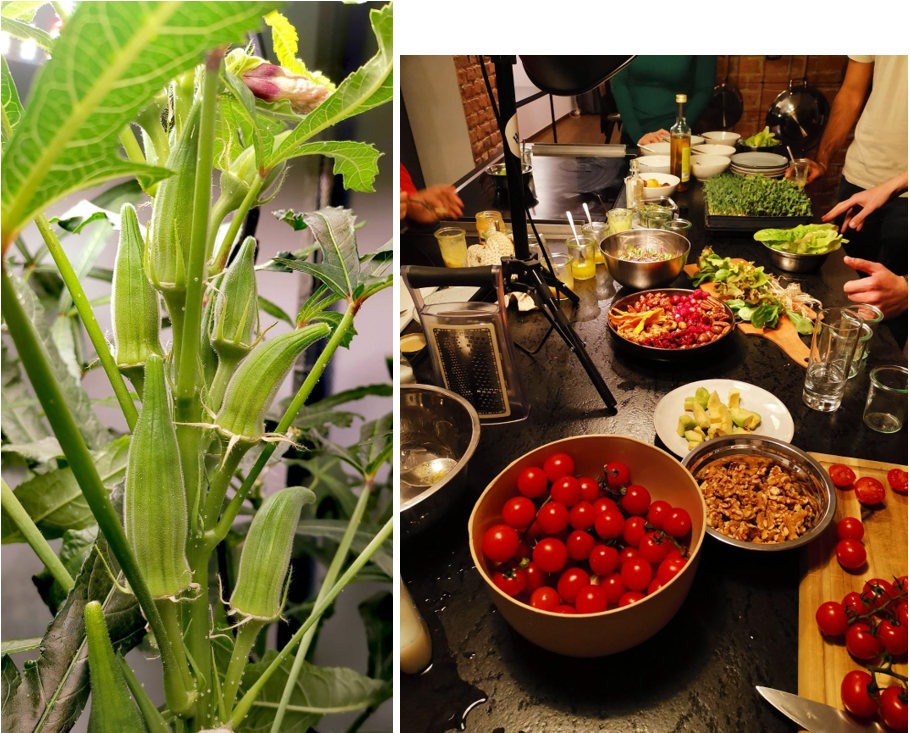
Sustainable food production: Hydroponics
We have launched a series of articles in which we introduce you to environmental challenges and their potential solutions with the help of businesses participating in the .wave start-up accelerator program. Meet Hans and Vipul, the founders of Eevi Gardens, and Ági, who established the Planet540.
What they have in common is that both start-ups use hydroponics to bring healthy, affordable and locally grown vegetables to the consumer’s table, and they are both participants in the .wave program of the Blue Planet Climate Protection Foundation.
“Hydroponics is a plant growing method that does not require fertile soil, instead we use water enriched with nutrients. One of the main advantages of farming is that it requires significantly less space than conventional crop cultivation. This can be attributed to the fact that the roots reach the nutrients directly from the water and can use them much faster and more efficiently. In addition, the root system also cleans the water, which can thus be used several times. The method is extremely water-efficient, much less fresh water is needed compared to the plants that are grown and watered in the traditional way. ” – says Vipul.

Due to the efficient utilization of space, it is possible to grow many more and different kinds of plants in a unit area than with traditional agricultural and horticultural methods. Due to the artificially closed system, pests and diseases can be avoided, so much less pesticides and water are needed.

The potential of this new method is also used by NASA, as its goal is to provide high-quality food in space for the astronauts. NASA is currently using a special nutrient supply technique, growing seed potatoes in climate-controlled greenhouses. In this hydroponic system, the volume of water is very small, which is an extremely important aspect of growing food in space. In addition to potatoes, they are also experimenting with growing soybeans and rice, but hydroponics is not for everyone, it turned out that some plants still feel better in their traditional terrestrial environment.
According to Vipul, “people take a lot of nutritional supplements and vitamins to be healthier and stronger, but these benefits can also be achieved directly from certain exotic vegetables. According to nutrition experts, vitamins and minerals found in plants are a much better alternative. This method is not new, as it is already a common practice in Asian countries, and it has also recently appeared in Western Europe as well. However, there are few growers who explain how to effectively incorporate these plants into the diet. Eevi Gardens wants to provide a solution for this.”
“At Planet540, we deal with the hydroponic cultivation of microgreens. Our added value is hyperlocalization, so we drastically reduce the environmental impact resulting from transport and packaging. We are committed to reducing quality hunger because we offer our consumers tasty, fresh, nutrient-rich, local vegetables,” Ági highlights.

Hydroponics in the .wave program
The goal of the .wave accelerator program at Blue Planet Climate Protection Foundation is to make innovations such as hydroponics as successful as possible. Early-stage companies with revolutionary innovation need a lot of help in the beginning. The .wave program is looking for market ready businesses from the Carpathian Basin that lead to positive environmental impacts through their operation.
We were wondering what these two teams thought about their time at .wave.?
“.wave absolutely met and even exceeded our expectations! The quality and level of the trainings was exceptional, where outstanding experts provided us with knowledge and skills. Perhaps we enjoyed the hands-on workshops the most and were surprised to see how much you can still learn about business development. We are very grateful to the entire .wave team for making this possible for us!” – as Hans explained.
For Ági and her colleagues, the program provided many constructive criticisms, which helped the team’s awareness, confidence and progress. In addition, the training sessions inspired them to learn more.
Hydroponics is a good option for countries that do not excel in traditional plant cultivation due to their dry climate. Although Hungary has excellent geographical features, it is still important to use new technologies such as hydroponics in order to reduce water consumption.
LATEST POSTS


Sustainability and beyond: how to future-proof your start-up

Sustainable food production: Hydroponics

Could your footwear be an ally in the fight against plastic pollution?

7 pain points, that .wave can solve for startups

